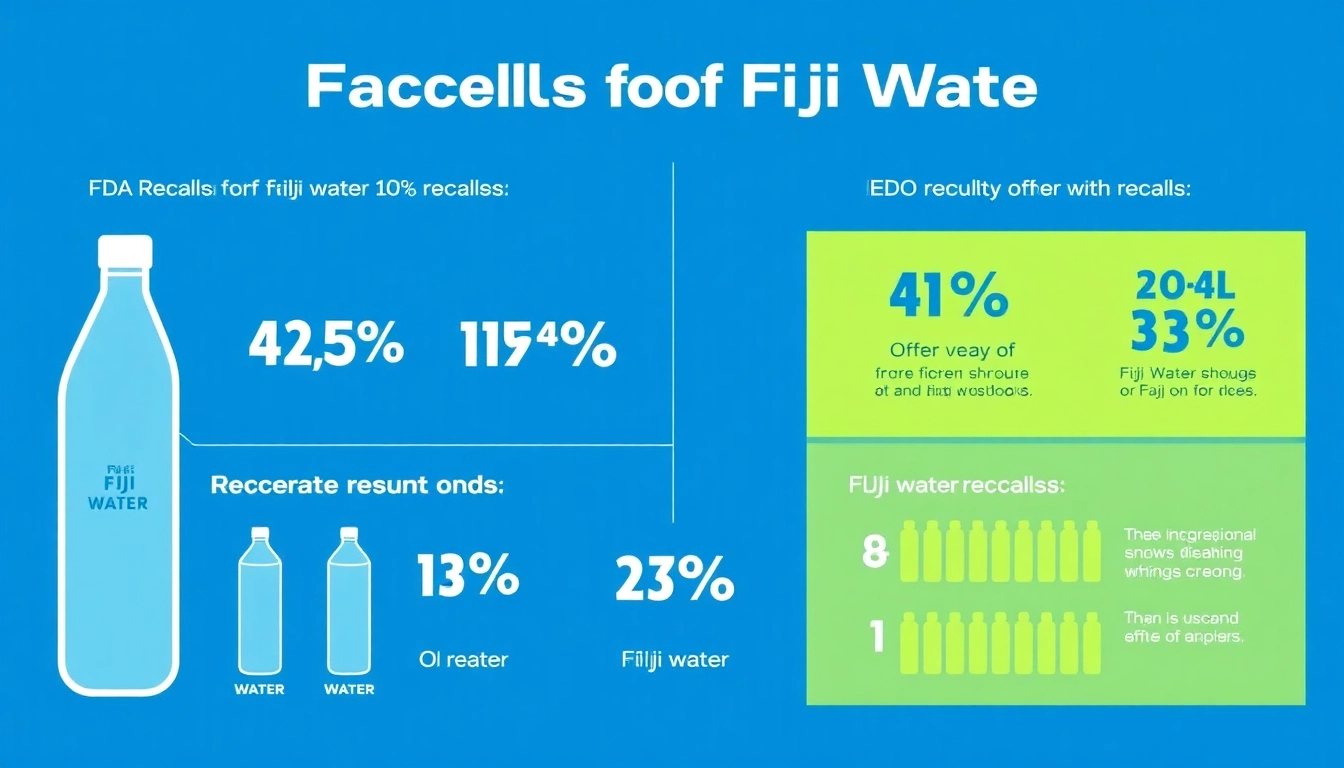
Overview of the FDA Recall of Fiji Water
In recent developments, the U.S. Food and Drug Administration (FDA) made headlines with the announcement of a significant recall affecting Fiji Natural Artesian Water. An estimated 78,533 cases of this popular bottled water, totaling around 1.9 million bottles, have been recalled due to concerns about contamination. This recall, designated as a Class III by the FDA, has drawn attention not only because of the volume involved but also due to the health implications associated with the contaminants found in the product.
On May 23, the FDA publicized these concerns, particularly emphasizing the elevated levels of manganese and other bacteria present in the water. The recalled bottles were primarily sold online through platforms such as Amazon, raising alarm among consumers who may have purchased them. In light of these facts, fda recalls fiji water has emerged as a trending topic, urging consumers to stay informed about their health.
What Triggered the Recall?
The recall was initiated following routine safety tests that uncovered troubling levels of manganese, a naturally occurring mineral. Though manganese is present in many foods and is typically safe in small amounts, excessive consumption can lead to neurological issues. The FDA categorized the recall as Class III, indicating that the use of the affected product may not pose a substantial risk of health hazards but still requires action to limit consumer exposure.
Details on the Affected Products
The product impacted by the recall is primarily Fiji Natural Artesian Water, particularly in 500 mL bottles. It is important for consumers to recognize that only specific batch numbers are affected. Consumers are advised to check receipts and labels against the FDA guidelines to determine whether the water they may have purchased falls under the recall. The recall affects not only direct purchases from retailers but also widely distributed online channels, including Amazon and specialty grocery stores.
Potential Health Risks from Contaminated Water
Contaminated water can pose significant health risks, particularly when harmful substances are present at elevated levels. Manganese, while beneficial in trace amounts, can lead to serious conditions if ingested in large quantities over time, including tremors, muscle rigidity, and neurological disorders resembling Parkinson’s disease. Furthermore, the presence of bacteria can lead to gastrointestinal illnesses, posing a risk for vulnerable populations, including children, the elderly, and individuals with weakened immune systems. Consumers should be vigilant in monitoring their bodily reactions post-consumption and seek medical advice if they suspect contamination from the recalled product.
Timeline of Events Leading to the Recall
Initial Testing and Discoveries
The events leading to the recall began in early May, when initial quality assurance tests conducted by manufacturers revealed elevated levels of contaminants in certain batches of Fiji Natural Artesian Water. With the understanding of a potential problem, the company proactively reached out to the FDA to report the test results, which initiated further investigation and testing of the product.
FDA Announcements and Media Coverage
After the FDA confirmed the findings, they promptly issued a public announcement on May 23, specifying the details of the recall and the number of affected cases. The media quickly picked up on the story, resulting in widespread coverage. Various reputable news outlets reported on the recall, emphasizing consumer awareness and the importance of consumer engagement in food safety.
Company Response and Consumer Guidance
Natural Waters of Viti Limited, the parent company producing Fiji Water, released statements acknowledging the recall and expressing their commitment to safety. The company has encouraged consumers to discard any affected bottles and provided guidance on how to identify recalled products. They have also emphasized their ongoing commitment to stringent testing and quality assurance processes to avoid future incidents.
Understanding Contaminants: Manganese and Bacteria
What is Manganese and Its Effects?
Manganese is an essential trace element important for various bodily functions, including metabolism and bone formation. However, excessive exposure, particularly from drinking water, can cause serious health issues. The FDA recognizes that chronic exposure to high levels of manganese can lead to neurological effects, creating concerns about its presence in drinking water sources.
Common Bacteria Found in Drinking Water
In addition to manganese, various strains of bacteria can contaminate drinking water, leading to illnesses. Common culprits include E. coli, coliforms, and various pathogens that thrive in untreated water. These bacteria can lead to diseases such as gastroenteritis or more severe illnesses, depending on the exposure and the individuals involved. Regular testing of water sources is crucial to ensure consumer safety.
How Contaminants Are Identified
Identifying contaminants in bottled water typically involves multi-stage testing protocols that include chemical analysis and microbiological testing. The FDA and private laboratories conduct routine assessments of water samples to ensure compliance with health guidelines. When contamination is suspected, immediate testing is performed to ascertain the presence of harmful substances or bacteria.
Consumer Recommendations Post-Recall
How to Identify Recalled Products
Consumers should be sure to verify whether they own any affected bottles by checking the labels and batch numbers against those provided in official FDA recall notices. Purchase receipts and the product packaging can also offer critical details. Often, the recalled products are identified by their health compliance codes that indicate they fall into the recall category.
What to Do If You Have An Affected Bottle
If you suspect you have an affected bottle of Fiji Water, it is advisable to refrain from consuming it. The FDA recommends that consumers discard the product or return it to the point of purchase for a full refund. Keeping abreast of ongoing announcements from FDA and retailers regarding consumer safety is essential.
Trustworthy Alternatives to Fiji Water
In light of recent events, consumers may want to consider alternative bottled water brands that adhere to rigorous safety standards and quality testing. Brands that offer transparency regarding their water sourcing and testing methods can provide more assurance for health-conscious consumers. Options might include not only other bottled waters but also filtration systems that can assure the safety of tap water.
The Future of Fiji Water and Consumer Safety
Steps Taken by Fiji Water to Ensure Safety
In response to the recall, Fiji Water is actively working to enhance its safety protocols. Implementations include stricter quality control measures and revised testing processes to prevent future issues. The company has committed to transparency regarding their safety efforts and has initiated collaborations with third-party laboratories to ensure their quality testing remains robust.
Ongoing Monitoring and FDA Regulations
The FDA continually monitors bottled water producers and has detailed regulations in place regarding product testing and safety compliance. Following this incident, the FDA may intensify its monitoring of Fiji Water and similar brands to bolster consumer safety confidence and avoid situations that could jeopardize public health in the future.
Consumer Advocacy and Impact on Purchasing Decisions
This recall has amplified conversations around consumer advocacy and safety in the bottled water industry. With increasing awareness, consumers are becoming more conscious of product safety, scrutinizing labels, and demanding transparency from producers. Such shifts in purchasing behavior can greatly influence how brands like Fiji Water engage with their customers, prompting a greater commitment to quality and safety.






